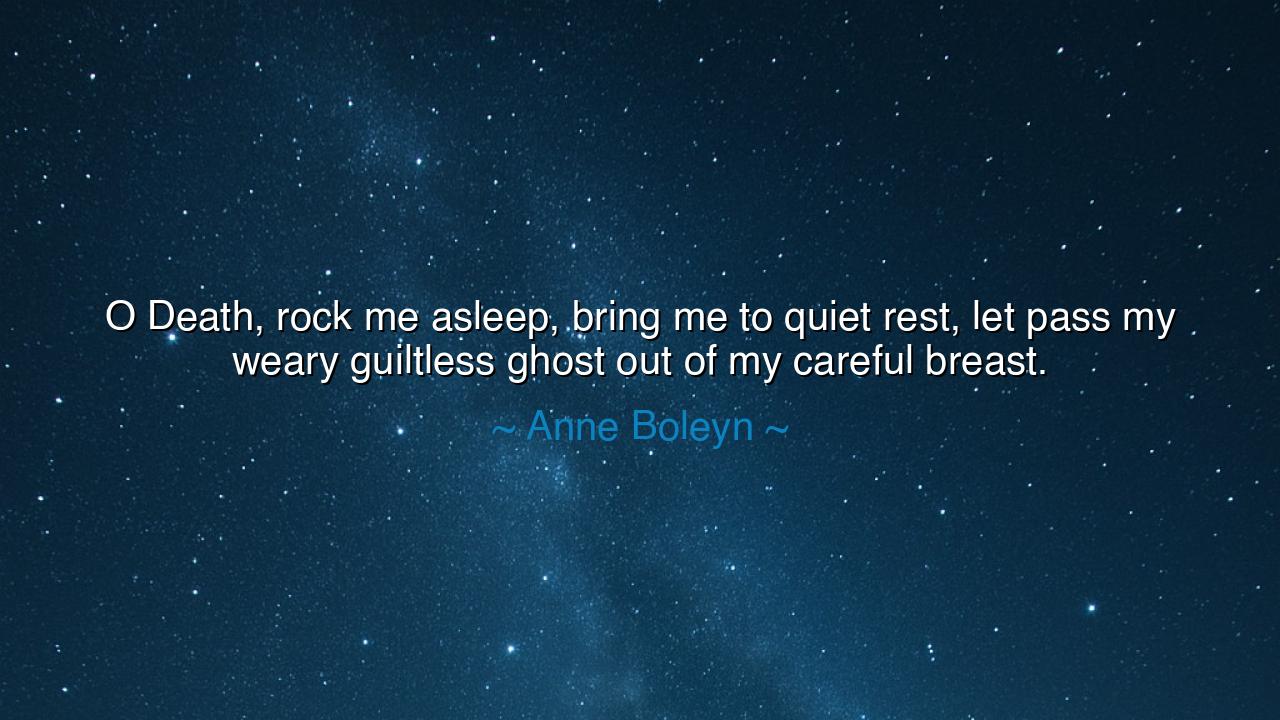
O Death, rock me asleep, bring me to quiet rest, let pass my
O Death, rock me asleep, bring me to quiet rest, let pass my weary guiltless ghost out of my careful breast.






The words of Anne Boleyn — “O Death, rock me asleep, bring me to quiet rest, let pass my weary guiltless ghost out of my careful breast.” — are not merely a lament, but a prayer whispered by a soul standing on the threshold of eternity. They were said, or perhaps written, in the final hours before her execution in 1536, when she, once Queen of England and wife to King Henry VIII, awaited her end in the Tower of London. In this fragile verse, death is no longer a terror, but a release — a gentle hand that promises peace where life has brought torment. Her plea to be “rocked asleep” by Death is not despair; it is resignation with dignity, a final act of grace from a woman stripped of all power but the freedom to meet her fate without fear.
To understand these words, one must know the tragic heart of Anne’s story. She had risen higher than any woman of her age — from lady-in-waiting to queen — and in her rise, she changed the course of English history. Her marriage to Henry VIII brought the English Reformation, the breaking away from the Church of Rome, and the birth of a new era. Yet the crown that once glittered became a chain. When she failed to bear the king a son, his affection turned to suspicion, and his passion to hatred. Falsely accused of adultery, treason, and incest, she was condemned to die. Alone in her cell, betrayed by court and kin alike, Anne faced not only death, but the cruel judgment of a world that saw her as both seductress and sinner. It was then, in that stillness, that her words took form — a song to Death, the only ally left to her.
When she calls upon Death to “bring me to quiet rest,” Anne speaks not only for herself, but for all souls weary of injustice. The ancients, too, saw death not as annihilation, but as a homecoming of the spirit. The Greeks called it Hypnos’s brother — the twin of sleep, who closes the eyes of mortals and carries them to peace. In Anne’s prayer, Death is personified as a nurse, not an executioner, rocking her gently to the rest that life denied her. Her “guiltless ghost” — a phrase heavy with defiance — insists upon her innocence. She does not curse her enemies; she entrusts her vindication to eternity. Thus, even in defeat, she triumphs — for her words turn the blade meant to silence her into a song that still echoes through the centuries.
The emotional power of her lament lies in its paradoxical serenity. Here is a woman condemned, yet unbroken. She does not rage against her fate; she accepts it with the composure of one who has glimpsed truth beyond suffering. In her quiet invocation to Death, she finds freedom greater than any kingdom could grant. For in the end, death comes to all — king and prisoner, tyrant and saint alike — and in that equality, Anne finds solace. What was denied her in life — mercy, peace, and justice — she seeks in the eternal rest that only death can offer. Her calmness in the face of annihilation recalls the stoic virtue of Socrates, who drank the hemlock with composure, trusting that no evil could harm the righteous soul.
Her poem also serves as a meditation on the futility of worldly power. The crown that once adorned her head could not save her; the love of a king turned to hatred; the court’s flattery became betrayal. Yet stripped of all that was temporal, Anne found the one thing no tyrant could touch — the freedom of the spirit. In that final hour, she became more powerful than the king himself. Her acceptance of death transformed her from a political victim into a symbol of endurance, of womanhood wronged but unbowed. As fire tempers steel, so suffering refines the soul. Thus, her words remain not a cry of despair, but a song of purification — the voice of one who meets eternity without shame.
History remembers Anne Boleyn through many lenses: as a queen, a mother, a martyr, and a catalyst of change. But her own words show her as something more profound — a soul that understood the mystery of mortality. She teaches that death is not to be feared when one’s conscience is clear. To live well is to prepare the heart for that final rest, so that when the hour comes, we may greet it as she did — not in terror, but in peace. For the wise do not flee death; they make peace with it, knowing it is but the doorway through which the spirit passes into truth.
From Anne’s final prayer, we may draw a lasting lesson: innocence and integrity are the soul’s true armor. Power may crumble, beauty may fade, fortune may turn its face — but the purity of conscience endures beyond the grave. When life’s trials press upon you, remember her words: “O Death, rock me asleep.” It is not a surrender to darkness, but a trust in the eternal rhythm of existence — that all suffering, all injustice, all toil, shall one day find its stillness. Live, then, as Anne lived at her end — with courage, with grace, and with the quiet faith that beyond life’s storms, there waits the infinite calm of peace.






AAdministratorAdministrator
Welcome, honored guests. Please leave a comment, we will respond soon